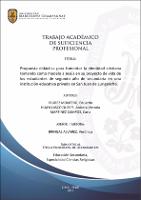Mostrar el registro sencillo del ítem
Propuesta didáctica para fomentar la identidad cristiana tomando como modelo a Jesús en su proyecto de vida de los estudiantes de segundo año de secundaria en una institución educativa privada en San Juan de Lurigancho.
| dc.contributor.advisor | Bringas Alvarez, Verónica | |
| dc.contributor.author | Florez Montero, Eduardo | |
| dc.contributor.author | Huayllasco Quispe, Aniceta Victoria | |
| dc.contributor.author | Martinez Campos, Carla | |
| dc.date.accessioned | 2019-02-27T18:28:44Z | |
| dc.date.available | 2019-02-27T18:28:44Z | |
| dc.date.issued | 2019 | |
| dc.identifier.uri | https://hdl.handle.net/20.500.14231/586 | |
| dc.description.abstract | El presente trabajo de suficiencia profesional es una propuesta didáctica para fomentar la identidad cristiana tomando como modelo a Jesús en el proyecto de vida de los estudiantes de segundo año de secundaria en una institución educativa de San Juan de Lurigancho. En el primer capítulo se hace un diagnóstico de la institución educativa y sus estudiantes además se señalan los objetivos y la justificación del trabajo. En el capítulo segundo, se desarrolla el marco teórico, dentro de las bases teóricas del paradigma socio-cognitivo-humanista, aquí hemos presentado los aportes sustanciales de Piaget, Ausubel, Bruner, Vygotsky, Feuerstein, Sternberg y de Martiniano, entre otros. Este paradigma se enfoca en los procesos de aprendizaje de los estudiantes, en función de sus condiciones personales y sus características biológicas y psicológicas. También toma en cuenta sus aprendizajes previos y su potencialidad cognitiva, sin dejar de lado la cultura y el contexto social. El maestro es un mediador o facilitador que brinda las herramientas y la motivación ajustada para que el estudiante construya su aprendizaje de manera significativa. Asimismo, se ha precisado la definición y naturaleza del paradigma, su metodología, sus estrategias de evaluación por capacidades y destrezas centradas en el aprendizaje del estudiante. También se han definido los términos básicos de esta propuesta didáctica. En el capítulo tercero, está la programación curricular general y específica, desde las competencias y estándares propios del área de religión, hasta las destrezas elegidas en cada sesión de aprendizaje. Se ha presentado una propuesta completa para desarrollar destrezas, conocimientos y actitudes que fomentan en el estudiante la construcción de sus aprendizajes de manera funcional y trascendente en su proyecto de vida tomando como modelo a Jesús. | es_ES |
| dc.description.abstract | The current work of professional sufficiency is a didactic proposal to promote the Christian identity as a model to Jesus in the project of the student’s life in the second year of secondary in an educational institution of San Juan de Lurigancho. In the first chapter, we have made an institutional diagnosis not only for the institution also the students, in addition the objectives and the justification of the work are indicated. In the second chapter, the theoretical framework is developed, within the theoretical bases of the sociocognitive humanist paradigm, here we have presented the substantial contributions of Piaget, Ausubel, Bruner, Vygotsky, Feuerstein, Stemberg and Martiniano, among others. This paradigm focuses on the learning processes of students, based on their personal conditions and their biological and psychological characteristics. It also takes into account their previous learning and cognitive potential, without neglecting the culture and social context. It also takes into account their previous learning and cognitive potential, without neglecting the culture and social context. The teacher is a facilitator who provides the tools and the adjusted motivation for the student to build their learning in a meaningful way. Likewise, the definition and nature of the paradigm, its methodology, its evaluation strategies for skills and abilities centered on student learning have been specified. The basic terms of this didactic proposal have also been defined. In the third chapter, there is a general and specific curricular programmed, from the competences and standards based on the religion areas, to the skills chosen in each learning session. A complete proposal has been presented to develop skills, knowledge and attitudes that encourage students to build their learning in a functional and transcendent way taking Jesus as a model. | en_US |
| dc.description.uri | Trabajo de suficiencia profesional | es_ES |
| dc.format | application/pdf | es_ES |
| dc.language.iso | spa | es_ES |
| dc.publisher | Universidad Marcelino Champagnat | es_ES |
| dc.rights | info:eu-repo/semantics/openAccess | es_ES |
| dc.rights.uri | http://creativecommons.org/licenses/by-nc-nd/2.5/pe/ | es_ES |
| dc.source | Repositorio institucional - UMCH | es_ES |
| dc.source | Universidad Marcelino Champagnat | es_ES |
| dc.subject | Propuesta didáctica | es_ES |
| dc.subject | Identidad cristiana | es_ES |
| dc.title | Propuesta didáctica para fomentar la identidad cristiana tomando como modelo a Jesús en su proyecto de vida de los estudiantes de segundo año de secundaria en una institución educativa privada en San Juan de Lurigancho. | es_ES |
| dc.type | info:eu-repo/semantics/bachelorThesis | es_ES |
| thesis.degree.name | Licenciado en Educación Secundaria - Especialidad de Ciencias Religiosas | es_ES |
| thesis.degree.grantor | Universidad Marcelino Champagnat. Facultad de Educación y Psicología | es_ES |
| thesis.degree.level | Titulo Profesional | es_ES |
| thesis.degree.discipline | Ciencias Religiosas | es_ES |
| thesis.degree.program | Educación Secundaria | es_ES |


